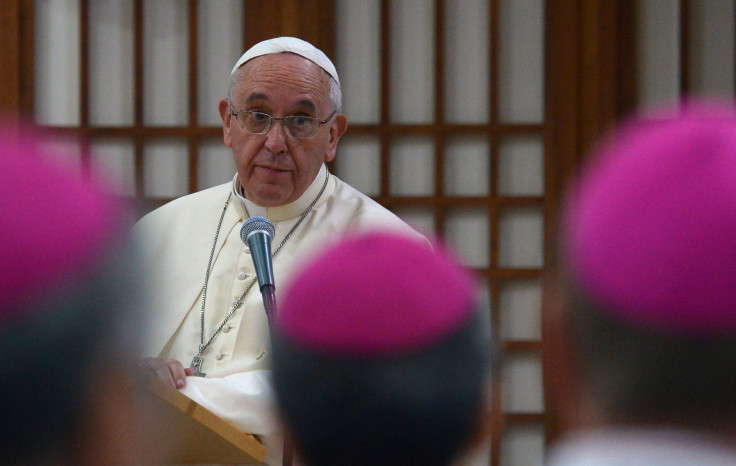Pope Francis Asia Visit: Pontiff Tells Asia's Communist Nations Not To Fear Christianity

(Reuters) - Pope Francis, in remarks clearly intended for communist-ruled countries such as China, North Korea and Vietnam, said on Sunday that Asian governments should not fear Christians as they did not want to "come as conquerors" but be integral parts of local cultures.
Francis made his comments, some of them unscripted, in an address to about 70 bishops from 35 Asian countries gathered in the town of Haeme, south of Seoul, on the next-to-last day of his trip to South Korea.
He told them the Church was committed to dialogue with everyone, saying: "In this spirit of openness to others, I earnestly hope that those countries of your continent with whom the Holy See does not yet enjoy a full relationship, may not hesitate to further a dialogue for the benefit of all."
Francis then added, in unscripted remarks, that he was talking of "not just political dialogue but also fraternal". He added that "Christians do not come as conquerors" who erase national and cultural identities but wanted to "walk together".
The pope's words were applicable to several nations in Asia where the Church is associated with colonialism, particularly China, which has had no formal relations since shortly after the Communist Party took power in 1949.
"It's an offer, an openness, a readiness to engage in dialogue for the well-being of the Church and the people in these different lands," Vatican spokesman Father Federico Lombardi told reporters. "Good Catholics can also be good citizens. The authorities do not have to fear the Holy See as something that exercises power in their land. It is religious."
The Catholic Church in China is divided into two communities: an "official" Church known as the "Patriotic Association" answerable to the Communist Party, and an underground Church that swears allegiance only to the pope in Rome.
A TURNED-DOWN INVITE
They also apply to isolated North Korea, where religious freedom is constitutionally guaranteed provided it does not undermine the state, but outside of a small handful of government-controlled places of worship, no open religious activity is allowed.
North Korea turned down an invitation from the South Korean Catholic church for members of its state-run Korean Catholic Association to attend a papal mass on Monday in Seoul, citing as a reason joint U.S.-South Korean military drills due to begin the same day.
The Vatican's relations with Vietnam have improved significantly in recent years, though the two still do not have full diplomatic ties.
Francis, who on Sunday afternoon was due to celebrate a Mass closing an gathering of Asian Catholic youth, told the bishops the Church should not aim to grow by aggressive conversion efforts, but by what he called "attraction".
When Francis travelled from Rome to Seoul on Thursday, his plane was allowed to cross Chinese air space. It was the first time a pope had been allowed to fly over China on Asian tours. His predecessor John Paul II had to avoid Chinese airspace.
During his flight, Francis sent an unprecedented message of goodwill to China, where the Church is keen to establish a greater presence, telling President Xi Jinping he was praying for peace and well-being for all Chinese people.
CHINA 'NOTES' THE POSITION
China's Foreign Ministry on Thursday said it had "noted" the Pope's position, and repeated its position that Beijing was sincere about wanting to improve relations with the Vatican.
"We are willing to keep working hard with the Vatican to carry out constructive dialogue and push for the improvement of bilateral ties," the ministry said in a statement faxed to Reuters. [ID:nL4N0QK18C}
In its statement, Beijing did not address the issue of Chinese barred from attending a youth event in Korea.
About half of more than 100 Chinese who had planned to attend Sunday's Asian Youth Day event were unable to do so due to "a complicated situation inside China", an official with the local organiser of the pope's visit told reporters on Thursday.
The main point of contention between Beijing and the Vatican is which side should have the final say in the appointment of bishops.
The Vatican has been sending olive branches to China for years, but a major stumbling block is the Holy See's continued recognition of Taiwan, which Beijing considers a renegade province.
Before leaving Seoul for Haemi, the pope fulfilled a promise he made the day after he arrived - to baptise the father of a victim of the Sewol ferry disaster, in which more than 300 people, most of them school children, were killed in April.
Lee Ho-Jin had been preparing to convert and asked the pope to perform the rite himself. It was carried out in the chapel of the Vatican embassy in Seoul on Sunday morning, a spokesman said. Lee decided to take the name Francis as his Christian name in honour of the pope, a spokesman said.
(Additional reporting by Sohee Kim, Ju-min Park and Narae Kim; Editing by Tony Munroeand Richard Borsuk)
© Copyright Thomson Reuters 2024. All rights reserved.




















